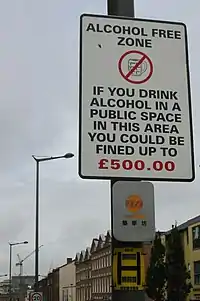Alcohol-free zone
An alcohol-free zone is a geographic area, location or establishment where the public consumption and sale of alcoholic beverages is prohibited.[1][2] Alcohol-free zones have been established in some areas to address problems with drinking- and binge drinking-related crime, antisocial behavior, assaults and disorderly behavior.[3][4] Alcohol-free zones have been opposed in some communities, such as in Bath, England, which has "a tradition of open-air bars and restaurants."[3]

Alcohol-free zones
Australia
In New South Wales, Australia, some streets are designated as alcohol-free zones, which is demarcated with signage stating such.[5] Police may issue a warning to violators, and those who continue to drink can be fined and have their alcoholic beverages seized.[5] Many parks in New South Wales are designated as alcohol-free zones.[5] Bondi in New South Wales, Australia established an alcohol-free zone in the city in 2004 in efforts to reduce assaults and antisocial behavior influenced by street drinking.[3]
As of April 2016, Sydney, Australia has over 60 alcohol-free zones.[1] The City Council of Sydney proposed to eliminate the alcohol-free zones in April 2016.[1]
Azerbaijan
Alcohol-free zone networks have been established in areas of Azerbaijan since at least 1996.[6] These zones are located in areas such as cafes, tea shops and recreation centers.[6]
England

The first alcohol-free zone established in the United Kingdom was in Coventry, England in 1988.[7] Initially, the entire city center was declared to be an alcohol-free zone.[7] The zone was later expanded to include the entire city.[7]
Boston, Lincolnshire established a street drinking ban in January 2015 to address concerns with the antisocial problems associated with public alcohol consumption.[8] The street drinking ban includes the town center and other areas.[8] Under rules of the ban, those caught drinking in these areas can be fined £100 for a first offense.[8] A second offense within six months after having committed a first one can be fined up to £500.[8] Additionally, those that are requested to stop drinking and continue to do so can receive a fine of up to £500.[8] In January 2015 to commemorate the event, various town council members and city police attended an event where cans of beer were poured down a city street drain.[8]
In 2009, Knowsley, Merseyside established alcohol-free zones in some of its parks to address problems with binge drinking-related crime and antisocial behavior.[4] Drinking in licensed drinking establishments was not affected by the zones.[4]
Liverpool, England has some alcohol-free zones in areas of the city.[9]
India
The entire region of Attappadi, Kerala, India was established as an alcohol-free zone in 1996 by Chief Minister AK Antony.[10] Despite the ban, alcohol has been illegally brought into the region by community residents who travel to Annaikatti to purchase liquor from TASMAC stores.[10]
United States
Some parks and recreation areas in the United States are alcohol-free zones, such as in Johnson County, Iowa, where alcohol consumption is allowed in some park and recreation areas but not others.[11] For example, alcoholic beverages may be consumed in some day use areas and campgrounds in parks, but not in beach areas within some parks.[11]
The riverfront at Covington, Ohio was established as an alcohol-free zone circa 1989 by Covington police.[12]
See also
References
- Barclay, Andrew (April 6, 2016). "Alcohol-free zone removal a 'win for the marginalised'". Altmedia. Archived from the original on June 30, 2016. Retrieved June 8, 2016.
- Saggers, S.; Gray, D. (1998). Dealing with Alcohol: Indigenous Usage in Australia, New Zealand and Canada. Cambridge University Press. p. 159. ISBN 978-0-521-62977-5. Retrieved June 8, 2016.
- Mazerolle, L.; Ransley, J. (2006). Third Party Policing. Cambridge Studies in Criminology. Cambridge University Press. p. 92. ISBN 978-1-139-44751-5. Retrieved June 8, 2016.
- Martin, J.; Lancer, D. (2015). AQA Law for AS Sixth Edition. Hodder Education. p. 66. ISBN 978-1-4718-5024-0. Retrieved June 8, 2016.
- Sanders, J. (2010). Youth Justice: Your Guide to Cops and Courts in New South Wales, 4th Edition. Legal tool kit. Federation Press. p. 98. ISBN 978-1-86287-812-9. Retrieved June 8, 2016.
- White, S. (1996). Russia Goes Dry: Alcohol, State and Society. Cambridge University Press. p. 77. ISBN 978-0-521-55849-5. Retrieved June 8, 2016.
- Bentley, David (January 21, 2015). "We look at 20 things Coventry gave the world as driverless cars hit streets". Coventry Telegraph. Retrieved June 8, 2016.
- Target, Boston (January 16, 2015). "as council leader pours away a beer". Boston Target. Archived from the original on 2015-06-28. Retrieved June 8, 2016.
- Wright, Jade (July 17, 2015). "Free events announced for Liverpool Pride 2015". Liverpool Echo. Retrieved June 8, 2016.
- "TN liquor floods alcohol-free zone in Kerala: Tribals protest against TASMAC". The News Minute. March 1, 2016. Retrieved June 8, 2016.
- Schmidt, Mitchell (May 27, 2016). "Memorial Day: Before you crack a beer, know the rules at popular recreation areas". The Gazette. Retrieved June 8, 2016.
- Pulfer, Laura (September 1989). "Mugfest". Cincinnati Magazine. p. 6. Retrieved 8 June 2016.
External links
 Media related to Alcohol prohibition signs at Wikimedia Commons
Media related to Alcohol prohibition signs at Wikimedia Commons